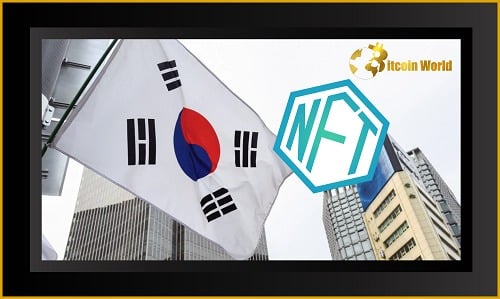South Korea is making significant strides in the digital asset realm! President-elect Yoon Suk-yeol’s campaign promise to foster the NFT market is taking concrete form as the Ministry of Culture, Sports, and Tourism announced on April 12th their plans to adopt an NFT copyright policy. This isn’t just about ticking boxes; it’s a strategic move to tackle the growing problem of fake NFTs and simultaneously fuel the burgeoning metaverse ecosystem. Think of it as laying down the legal groundwork for a more trustworthy and vibrant digital future.
During his campaign trail, Yoon Suk-yeol emphasized his commitment to “nurturing a new concept digital asset market through NFT activation,” according to Ajunews. He further pledged to revitalize the token economy once in office. This recent announcement signals a clear intention to deliver on those promises and position South Korea as a leader in the digital asset space.
Following the public statement, the South Korean government officially initiated a “metaverse/NFT-related copyright concerns research service” through the Ministry of Culture, Sports, and Tourism. This isn’t just talk; the ministry is actively in the process of selecting a company and finalizing a formal contract to carry out this crucial research. It’s a hands-on approach, showing they’re serious about understanding and addressing the intricacies of NFT copyright.
Identifying and Resolving NFT Copyright Issues
Currently, the Ministry and the Presidential Transition Committee are deeply engaged in evaluating and shaping the NFT policy, as reported by Ajunews.
“We’re at a point where we’re constantly reviewing the NFT policy with the takeover committee,” a ministry official stated, highlighting the ongoing and collaborative nature of this policy development.
But what’s the ultimate aim? According to sources, South Korea is striving to be at the forefront of resolving copyright challenges that naturally arise with the increasing use of NFTs. They’re not just reacting to the trend; they’re proactively seeking solutions and aiming to set a global standard.
Let’s break down why this is such a significant development for the NFT and metaverse space:
- Combating Counterfeit NFTs: Imagine buying a digital artwork only to find out it’s a fake. NFT copyright policies are crucial to establish authenticity and protect creators and buyers from fraud. This move directly addresses a major concern in the NFT market.
- Boosting Metaverse Growth: A clear copyright framework builds trust and encourages investment and participation in the metaverse. Creators will feel more secure in deploying their work as NFTs, knowing their rights are protected. This policy acts as a catalyst for metaverse expansion in South Korea.
- Supporting Digital Creators: Copyright protection empowers artists, musicians, and other digital creators to monetize their work effectively in the NFT space. It fosters a fairer and more sustainable ecosystem for digital creativity.
- Attracting Global Investment: A robust and well-defined NFT copyright policy can make South Korea a more attractive destination for global NFT projects and businesses. It signals a forward-thinking and regulated environment, appealing to international players.
- Setting a Global Precedent: As one of the first nations to actively address NFT copyright at a governmental level, South Korea has the potential to become a global leader in this area. Their policies could serve as a model for other countries grappling with similar issues.
What are the potential challenges that South Korea might face in implementing this policy?
- Defining ‘Originality’ in Digital Art: Establishing clear guidelines on what constitutes original digital art and how copyright applies to NFTs can be complex. The lines between inspiration, derivative works, and plagiarism can be blurry in the digital realm.
- Enforcement and Jurisdiction: NFTs operate on a global, decentralized blockchain. Enforcing copyright regulations across borders and identifying responsible parties in cases of infringement can be challenging.
- Technological Complexity: Understanding the technical nuances of blockchain and NFTs is essential for creating effective and relevant copyright policies. Policymakers need to be well-versed in the technology to avoid creating outdated or ineffective regulations.
- Balancing Innovation and Regulation: The key is to create a regulatory framework that protects copyright without stifling innovation and the dynamic nature of the NFT market. Finding this balance will be crucial for long-term success.
- Public Awareness and Education: Effective implementation requires educating creators, buyers, and the general public about NFT copyright and their rights and responsibilities within the new policy framework.
Examples of Potential NFT Copyright Issues:
| Issue | Description |
|---|---|
| Unauthorized Minting | Someone mints an NFT using copyrighted artwork without the owner’s permission. |
| Counterfeit NFTs | Fake NFTs are created and sold, mimicking genuine and valuable NFTs. |
| Derivative Works Disputes | Disagreements arise over whether an NFT is a legitimate derivative work or copyright infringement. |
| Smart Contract Copyright | Copyright issues related to the code and functionality embedded within NFT smart contracts. |
South Korea’s proactive approach to NFT copyright is a significant step forward for the digital asset industry. By addressing these critical issues head-on, they are not only protecting creators and consumers within their borders but also contributing to the maturation and broader acceptance of NFTs globally. It will be fascinating to watch how their policies unfold and the impact they have on the future of the metaverse and digital ownership.
Related Post – Ferrari joins the NFT universe through a collaboration with a Swiss…
Disclaimer: The information provided is not trading advice, Bitcoinworld.co.in holds no liability for any investments made based on the information provided on this page. We strongly recommend independent research and/or consultation with a qualified professional before making any investment decisions.


